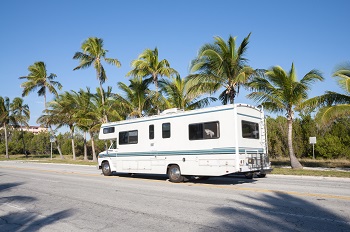WEDNESDAY, MAY 19, 2021
Road trips are an enjoyable way to enjoy the scenery, especially in an RV (recreational vehicle). RVs are motor vehicles and dwelling places, and therefore, need both types of insurance—which RV insurance provides. 
Understanding RV Insurance
You have to drive your RV from place to place, even if you keep it parked in one site for a long period of time. Therefore, it needs various pieces of motor vehicle insurance; standard car insurance won’t work.
In addition, because an RV functions as a home, there are risks and liabilities that may threaten the homeowner. RV insurance provides many types of coverage that both separate homeowners and car insurance provide. However, it comes with specifically tailored terms and limits that apply to the special status of an RV. Whether you plan to use it on the road, or stay in it as your residence during vacations, you’ll need both types of protection.
RV Auto Coverage
RV operators need motor vehicle insurance, which may include:
-
Liability insurance: Required of all drivers by most states, liability insurance pays when RV drivers cause wrecks that damage the property of others or injure third parties.
-
Collision coverage: If the RV sustains damage in a wreck, this coverage can pay for the repairs.
-
Comprehensive insurance: Non-accident damage has coverage under this part of your policy.
-
Uninsured/underinsured motorist coverage: If parties responsible for any damage to your RV don’t have liability insurance, or limits aren’t high enough to cover the costs, then this coverage on your own policy can help.
Residential Coverage
While living in the RV for any length of time, you want to keep it as secure as your home. Therefore, consider adding this coverage:
-
Contents coverage: Your personal belongings can receive coverage under this policy.
-
Personal liability insurance: This applies when you cause harm to someone else, but while your RV is set up at a camp site. Policies also pay an accidental medical payments component, which allows you to assist people when they get hurt.
-
Expenses coverage: There’s no guarantee that your vacation will work out perfectly. This policy can help you avoid paying for things such as hotel or dining costs until you can return home.
Ask your RV insurer how these policies will apply during temporary vacations as opposed to permanent residency in the RV. Coverage might apply differently in each situation.
No Comments
Post a Comment |
|
Required
|
|
Required (Not Displayed)
|
|
Required
|
All comments are moderated and stripped of HTML.
|
|
|
|
|
|
NOTICE: This blog and website are made available by the publisher for educational and informational purposes only.
It is not be used as a substitute for competent insurance, legal, or tax advice from a licensed professional
in your state. By using this blog site you understand that there is no broker client relationship between
you and the blog and website publisher.
|
Blog Archive
|
|